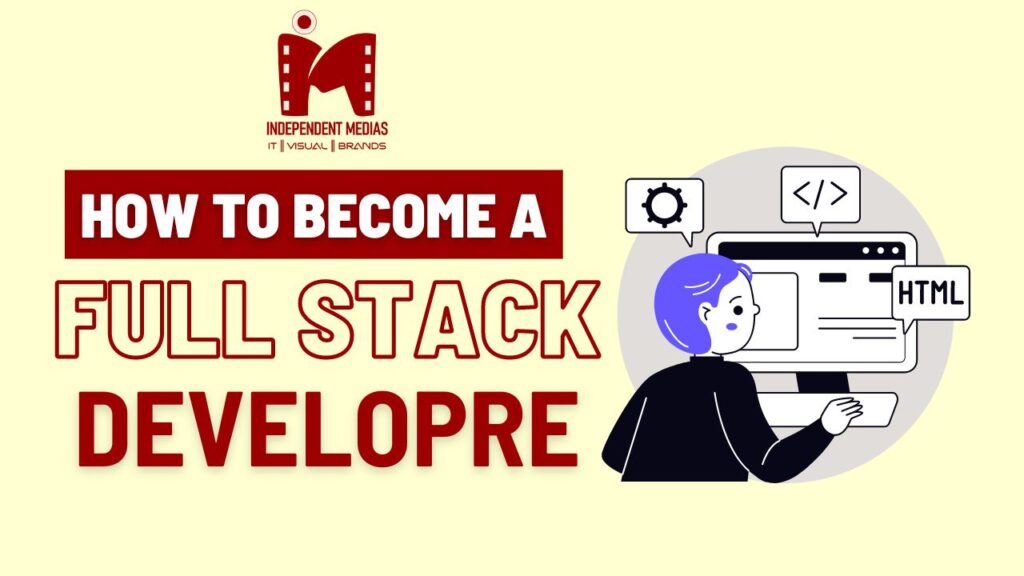
Comprehensive Full Stack Development Course: From Beginner to Advanced
Independent medias Full Stack Development course has become one of the most in-demand skills in the tech industry. Full stack developers are proficient in both front-end (client-side) and back-end (server-side) development, making them highly versatile professionals who can build, manage, and maintain entire web applications. Independent Medias Full Stack Development Course takes you from the basics of web development to advanced techniques, ensuring that you gain the expertise needed to become a full-stack developer capable of working with modern tools, frameworks, and technologies.
Course Overview
This Full Stack Development Course is designed to teach you how to develop complete web applications. You’ll start by learning HTML, CSS, and JavaScript, and progress through advanced topics like Node.js, Express, React, MongoDB, and more. The course is divided into modules, with hands-on projects that simulate real-world applications, helping you build a professional portfolio. By the end of the course, you will have the skills to design, develop, and deploy full-scale web applications from scratch.
Course Structure: Beginner to Advanced Level
1. Introduction to Web Development (Beginner Level)
In this module, you’ll start with the basics of web development, learning HTML5 and CSS3, the core technologies for building web pages. You’ll explore fundamental concepts such as web page layout, typography, and design principles. Additionally, you’ll learn how to create fully responsive websites using CSS frameworks like Bootstrap.
- Keywords: Learn HTML5, CSS for web development, responsive web design, Bootstrap tutorial, web page structure.
2. JavaScript and Front-End Development
JavaScript is the backbone of interactive web development. In this module, you’ll learn JavaScript fundamentals, including variables, functions, loops, and events. You’ll also explore advanced front-end topics like DOM manipulation, ES6 features, and asynchronous programming with AJAX. Additionally, you’ll be introduced to jQuery and React.js, a popular front-end JavaScript library, for building dynamic and responsive web applications.
- Keywords: Learn JavaScript for beginners, front-end development, React.js course, ES6 features, asynchronous programming, dynamic web pages.
3. Back-End Development with Node.js and Express.js
Back-end development focuses on creating the server side of web applications, where data is stored and processed. This module introduces you to Node.js, a popular runtime environment for building server-side applications using JavaScript. You’ll also learn Express.js, a powerful web application framework for Node.js. Topics covered include building RESTful APIs, managing databases, and handling authentication.
- Keywords: Node.js development, back-end with Express.js, building REST APIs, server-side programming, learn back-end development.
4. Database Management with MongoDB
In this module, you’ll learn how to integrate databases into your web applications. You’ll work with MongoDB, a NoSQL database, which is often used in full stack development because of its flexibility in storing and managing data. You’ll learn how to perform CRUD operations (Create, Read, Update, Delete), model data relationships, and manage large datasets.
- Keywords: Learn MongoDB, NoSQL databases, CRUD operations in MongoDB, full stack databases, data management for web applications.
5. Version Control with Git and GitHub
Version control is crucial for tracking changes in your codebase, especially when working in teams. In this module, you’ll learn Git, the industry-standard version control system, and how to collaborate with other developers using GitHub. You’ll explore concepts like branching, merging, pull requests, and resolving conflicts, which are vital for collaborative software development.
- Keywords: Git and GitHub course, version control for developers, Git tutorial, managing code with GitHub, collaboration with Git.
6. Deployment and DevOps
The final step in full stack development is deploying your web applications to live environments. This module covers deployment techniques using cloud platforms like Heroku and Amazon Web Services (AWS). You’ll learn how to set up production environments, manage application scaling, and monitor performance. Additionally, you’ll explore DevOps tools and practices, which include Continuous Integration (CI) and Continuous Deployment (CD) pipelines to automate the development and deployment process.
- Keywords: Deploy web applications, AWS deployment, Heroku tutorial, DevOps tools for developers, CI/CD pipelines, cloud hosting for web developers.
7. Full Stack Project: Building a Complete Web Application
In this final module, you’ll put all the skills you’ve learned to the test by building a complete full-stack web application from scratch. This will include everything from designing the user interface to creating the back-end logic and database integration. You’ll also deploy your project to the cloud, making it accessible to users in real-time. This capstone project will be a valuable addition to your professional portfolio.
- Keywords: Full stack web application project, build and deploy web apps, portfolio project for full stack developers, practical full stack development.
Benefits of the Course
- Comprehensive Learning Path: You’ll gain a complete understanding of full stack development, from front-end design to back-end logic, databases, and deployment.
- Hands-On Experience: With real-world projects and assignments, you’ll gain practical experience building functional web applications, which is essential for mastering full stack development.
- In-Demand Skills: Learn industry-relevant tools like Node.js, React.js, Express.js, MongoDB, Git, and cloud platforms like AWS, ensuring you stay competitive in the job market.
- Flexible Learning: The course is designed to be completed at your own pace, with access to video tutorials, resources, and coding challenges.
- Portfolio Development: Build a professional portfolio with real-world projects, demonstrating your full stack skills to potential employers or clients.
- Career Preparation: This course equips you with the necessary skills for a career in web development, software engineering, or freelancing as a full stack developer.
Scope of the Full Stack Development Course
As the tech industry continues to grow, so does the demand for full-stack developers. After completing this course, you’ll have the skills to pursue various career paths, such as:
- Full Stack Developer: Work on both the front-end and back-end development of web applications, giving you the versatility to handle the entire development process.
- Front-End Developer: Focus on building the visual and interactive aspects of web applications using JavaScript, React.js, and other front-end tools.
- Back-End Developer: Specialize in server-side programming, handling databases, APIs, and business logic using Node.js, Express.js, and similar technologies.
- Freelance Full Stack Developer: Offer end-to-end web development services to clients around the world, working remotely.
- Software Engineer: Use your skills in full stack development to build, maintain, and scale software products for startups and tech companies.
Conclusion
Independent Medias Full Stack Development Course, from beginner to advanced levels, provides a comprehensive, hands-on learning experience that will equip you with the skills needed to succeed as a full-stack developer. Whether you want to work for a tech company, freelance, or start your own project, this course provides the technical knowledge, practical experience, and portfolio-building opportunities to help you achieve your goals. Start your journey into full stack development and unlock endless career opportunities today!
